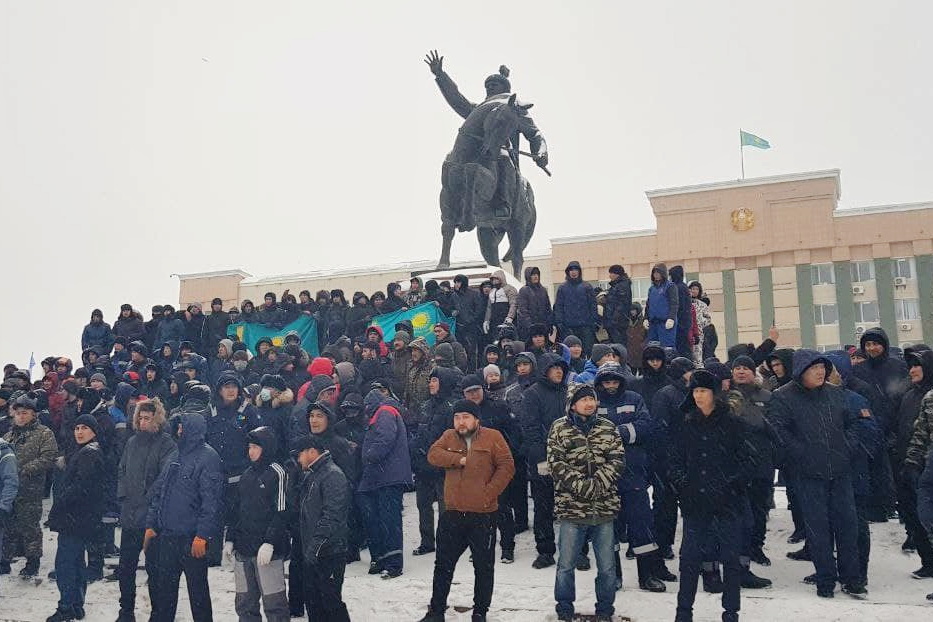Editor’s Note: The following are the analytical notes that Timothy Ash, senior strategist at Bluebay Asset Management, distributes to his subscribers. The Kyiv Independent is reposting it with permission.
It seems that “order” will be restored in Kazakhstan, but only with the help of Russian/CSTO (Collective Security Treaty Organization) troops.
The subsequent crackdown will likely be far reaching.
Events this week seemed to suggest that Kazakh security forces were reluctant to fire on their own people - no such problem exists for Russian President Vladimir Putin, who has proven more than willing to put down his own citizens, so will have absolutely no qualms in doing the same in other countries.
I would expect the bulk of the manpower here to be Russian, but with Belarus’ security forces using some of the “techniques” they have recently deployed at home.
Lesser parts are likely to be played by more reluctant partners such as the Armenians and Kyrgyz. All very sad but predictable, as it was always clear that Putin viewed Kazakhstan to be firmly in the Russian “sphere of influence” and Moscow would ultimately intervene if needed.
I think Moscow likely gave Kazakh President Kassym-Jomart Tokayev the ultimatum to clear demonstrations, or Russia would do it for them. This might ultimately end up with Northern Kazakhstan sliced off - the part where ethnic Russians are mostly located.
One can see shades here of Ukraine’s revolutions in 2003-2004 and 2013-2014, where Moscow gave Presidents Leonid Kuchma and Viktor Yanukovych orders to clear the streets of Kyiv, or else. Kuchma largely avoided bloodshed during the Orange Revolution, Yanukovych didn’t in 2014, and the rest is history.
In any event, the Kazakh “spring” looks set to turn into a long winter for the opposition.
What’s notable here is how the West has held its punches in criticizing Tokayev or still-influential ex-President Nursultan Nazarbayev. Perhaps Western leaders are mindful of not playing into the Russian narrative that this is all a Western plot and another attempt at a color revolution.
The West’s focus is on the looming US/NATO - Russia talks on Ukraine, and U.S. President Joe Biden does not want to make those negotiations even more difficult. There may also be a recognition of Kazakhstan’s important position as a major supplier of raw materials to global markets. There may also be a desire to see how this all plays out before reacting.
Global economic impact
From a market perspective the question will be: if the worst case happens and we see a brutal crackdown, will the West respond with sanctions and how does this impact Kazakhstan’s Environmental, Social, and Governance score (a rating used by investors to assess the social impact of putting money into a country)?
Will Kazakhstan follow Belarus’ course? It has become difficult lately for Western portfolio investors to hold Belarusian assets. Again, the broader setting in terms of U.S.-Russia relations and Kazakhstan’s importance in the global raw material supply chain will likely be significant.
There are still huge Western foreign direct investments in the country - from oil and energy to metals and even agriculture.
Presumably any crackdown will be accompanied by big social spending - looser fiscal policy and worsening the public finance profile, albeit from a very strong starting point with low debt ratios and plenty of foreign currency reserves. The popular focus on inflation will likely see the National Bank of Kazakhstan adopt a very hawkish monetary policy stance, as well as foreign currency intervention to keep the national currency, the tenge, stable.
A question arises here: if Russian troops are used to suppress Kazakh opposition, how will this impact popular perceptions of Russia, and will it risk a longer-term surge in Kazakh nationalist sentiment, which might be more difficult to control?
Ukraine crisis impact
I still don’t see all this having much of an impact on the crisis around Ukraine, and the U.S. President Joe Biden-Putin Geneva summit.
I think Putin will be smarting over what he will see as a Western plot in Kazakhstan. He will look for a face-saving payback in Geneva and ultimately in Ukraine.
Biden likely sees less need now to concede ground to Putin - he will see Putin as weakened by this and militarily stretched and less likely to further attack Ukraine. I think that would be a miscalculation as I think the wounded Putin is likely to be more dangerous now.
One final note in terms of Russia’s reaction to events in Kazakhstan: clearly Moscow would have planned for such an eventuality in Kazakhstan.
A military playbook would already be prepared, and they have just rolled it out. While Moscow likely will have been shocked by how quickly the unrest spread, and how quickly Kazakh security forces were overwhelmed, it has still tried to take advantage of the crisis — as it did in Belarus after elections challenged President Alexander Lukashenko’s dominance.
What we are seeing as a result is Russia tightening its grip on the near abroad — Russia is weakening the sovereignty of Belarus and Kazakhstan. Will this make the Russian-controlled “bloc” stronger?
The danger here is that a less free former Soviet Union space sees economic stagnation, outmigration, and decline. Security might be tighter in the bloc, but the long-term economic outlook is weaker as a result.













